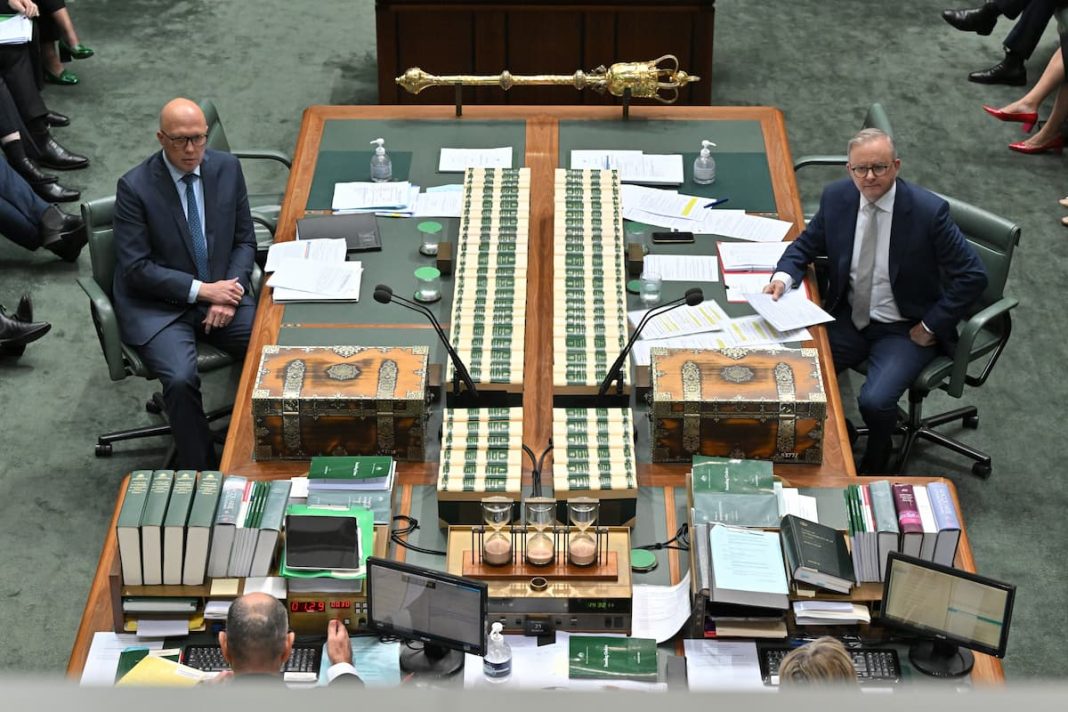Once written off as unelectable, Opposition Leader Peter Dutton is winning over Australian voters who are turning to the coalition for national security and economic management.
The Resolve Political Monitor, conducted for The Age and the Sydney Morning Herald, found 36 per cent of voters backed Mr Dutton as their preferred prime minister compared to 35 per cent who supported incumbent Anthony Albanese.
This is the first time the opposition leader has taken the lead in the race for voter sentiment in this survey.
Support for Mr Dutton was up four percentage points from the poll’s previous rendition in May, while Mr Albanese’s approval rating sank five percentage points.
Back in August 2022, Mr Albanese boasted a 37 per cent lead over his rival with 55 per cent preferring him, compared to 17 per cent for Mr Dutton.
Despite Mr Dutton’s increased appeal, pollster and strategist Kos Samaras still struggles to see a route for the coalition to form government at the next election.
“If you look at Resolve’s numbers, a significant proportion of Australians are not giving either leader any support,” he told AAP.
Mr Samaras backed Mr Albanese to form government at the next election, but whether that is in the form of a lower house minority or majority is 50-50.
He said with Australia’s electoral environment becoming increasingly fragmented, the preferred prime minister question is losing its currency as a diagnostic tool.
“That measure gives a nice headline … but it doesn’t give you the granular insight into what is really going to happen across a number of electorates,” Mr Samaras said.
The coalition’s primary vote has remained steady at 36 per cent, while the Labor Party’s support fell from 29 to 28 per cent, its lowest in three years.
But Mr Dutton remains unpopular in key inner-city electorates the coalition lost to independents in 2022, and there is no evidence he is achieving sufficient cut-through to crack open Labor’s stranglehold on outer-suburban seats, Mr Samaras said.
About 40 per cent of voters prefer Mr Dutton and the coalition as economic managers compared to 24 per cent who prefer Mr Albanese and the Labor Party.
On national security and defence, 42 per cent favoured the opposition, with 23 per cent opting for Labor and the prime minister.
Despite the dire outlook, cabinet minister Tanya Plibersek insisted Labor policies such as tax cuts, student debt relief and investment in Medicare would help alleviate cost of living pressures.
“We’re not focused on the polls, we’re focused on doing the right thing for Australian people,” she told Sunrise on Monday.
The results come as the coalition reignites Australia’s climate wars by threatening to scrap emissions reduction targets that had been agreed to under the Paris climate agreement.
Nationals MP Barnaby Joyce said the poll reflects Australians’ opinions on this discussion.
“Mr Albanese is concentrating on Paris and climate and these things and the issue in the rest of the world is they can’t pay for their groceries, their power bill,” he said.
A majority of survey respondents said it was most important to keep the cost of living low while seven per cent named environment and climate change as the highest priority.
Mr Samaras believes the climate is not a winning issue for the coalition in outer-suburban seats, while it could lose them votes in the inner city.
Voters preferred Labor’s management of environment and climate with 24 per cent favouring the government compared to 22 per cent who preferred the opposition.
Meanwhile, the Greens’ primary vote grew from 12 to 14 per cent.



